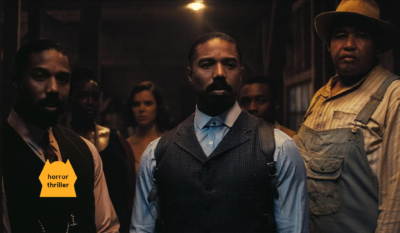NYFF 2023 | May December follows an actress (Natalie Portman) as she prepares to play a notorious tabloid figure (Julianne Moore) by shadowing her dredging up old wounds


May December begins with Julianne Moore dramatically opening a refrigerator door, while a dissonant chord strums and the camera locks into a closeup, and deadpan delivers the line, “I don't think we're going to have enough hot dogs.” While it is a high camp melodrama filled with a cast of near-absurd characters, at its heart it's a complex exploration of trauma, exploitation, and how all “grown-ups” are just children pretending to be adults. With Oscar winners Julianne Moore and Natalie Portman squaring off as dueling narcissists and Charles Melton giving a star-is-born performance, May December is one of the year's best.
May December had its North American premiere at the 2023 New York Film Festival.![]()

Right before the title card for director Todd Haynes‘ new film May December smash cuts onto the screen, Gracie Atherton-Yoo (Julianne Moore) swings open a refrigerator door. As the camera closes in on her face and a dissonant chord strums, she dramatically delivers the line, “I don't think we're going to have enough hot dogs.” From then on, it's impossible not to be transfixed by the high camp of this melodrama.
And there's so much devilishly delightful sparing between Gracie and actress Elizabeth Berry (Natalie Portman), who visits Gracie's Georgia home to prepare to play her in an upcoming movie, that it's surprising when the movie hits you with a flurry of complex emotions. Screenwriter Samy Burch, who marked her first appearance on the promotional circuit at the 2023 New York Film Festival, said of her screenplay, “I really like the tonal mix of humor and real, genuine sadness and heartbreak.” It's that exact melange of the darkly comedic melodrama and the deeply felt character study that make May December a satisfying — and deeply odd — romp.
ADVERTISEMENT
The reason Gracie's life warrants a movie is her notorious highly-publicized tabloid romance with her now husband Joe (Charles Melton) that swept the nation in the 90s. You see, Gracie and Joe started dating when she was 36-years-old and he was just thirteen-years-old. Twenty years later, the pair still receive their fair of attention — often of the fecal variety — as they live a quiet existence in their Savannah, Georgia seaside home. That is, until Elizabeth arrives.
Portman plays Elizabeth, who from what we can gather is best-known for her performance on a Grey's Anatomy-type show, with a satirical edge — perhaps chiding her own star persona (or at the very least her iconic accent from her performance in Jackie). She probes Gracie's life like a psychologist analyzing her patient or a serial killer their prey. She observes her mannerisms, dissects every decision she makes, even copies her makeup routine in a scene that edges on Persona-esque horror — a clear inspiration.
As she observes more people in Gracie's orbit, we uncover the ripple effects of her crimes that she went to prison for as we see in hilariously accurate tabloid covers (“Pregnant in Prison!”). Her ex-husband Tom (D.W. Moffat) swears he's over all of it before snapping as he starts to recall the incident, Gracie and Tom's son Georgie (Cory Michael Smith) — yup, his name is Georgie — is a man-child who is the diva lead singer of a band that performs at a local pub, meanwhile the current manager of the pet shop where Gracie and Joe first met milks the publicity for everything it's worth — even keeping a laminated copy of a newspaper article about the incident on the counter.
ADVERTISEMENT
The cast of characters border on absurd almost becoming caricature, but Haynes keeps the film grounded in some reality despite the camp hijinks. However, Elizabeth isn't some innocent voyeur. When she finds herself in the notorious storeroom where Gracie and Joe's first sexual encounter took place she acts it out so convincingly you can't tell whether she's actually pleasuring herself. We're always kept a distance from her true intentions, but at the very least we can infer that she's not as afraid of exploiting the family for her own work as she says she is.
However, Gracie isn't as forthcoming with the truth as she thinks she is either. She's almost dismissive of her past. “Everyone's got skeletons in their closet,” she says as if she's referring to a spat of unpaid parking tickets. Both women are unwilling to cede their true selves to the other. Burch's screenplay doesn't shy away from making Gracie and Elizabeth irredeemable. Something we don't often get to see.
And while there is legitimate fun to be had with the passive-aggressive meeting of two different breeds of narcissist, at the heart of May December is a sensitive character study of a man who was both asked to grow up too fast and not afforded the opportunity to. Melton, in a star-making Oscar-worthy performance, portrays Joe with a depth that makes you so sympathetic to his plight that it almost feels like whiplash compared to melodrama. While he starts off as the capable father or doting husband, when he begins interacting with Elizabeth — she herself is 36-years-old, the age that he met Gracie — we watch his body language revert to the 13-year-old boy in that pet store storage room.
ADVERTISEMENT
With hunched shoulders, his hands in his pockets, and mumbled replies, we see that through all these years Joe has just been putting on the air of an adult. In one of the most heartbreaking scenes, he smokes weed for the first time ever — surprising for a man in his late 30s — with his college-bound son (Gabriel Chung) and through sobs tells him of his hopes that he will live a happy life: “I don't know if we're connecting, or if I'm creating a bad memory for you.” In the subtext, he hopes that he won't suffer the same traumas that he himself had to endure. It's that incisive insight that makes the movie as compelling as it is entertaining.
On the surface, May December shouldn't work with its contrasting tones of dark comedy mixed with near-parody satirical elements and sentimental dramatics with complex human condition. However, it manages to find balance in way that allows you to enjoy it without letting you get too comfortable with the sensitive situation.
In a climactic scene, Elizabeth tells a despondent Joe, “this is what grown-ups do.” However, what Burch's screenplay presupposes is that the concept of a “grown-up” doesn't actually exist. Regardless of age, people are not much more than their child-self reacting to the things in their present filtered through their past. Every character in the movie has been stunted in their coming-of-age in some way — perhaps because you never stop coming of age. We watch in real-time as Gracie tears into her own children with the gusto of Faye Dunaway in Mommie Dearest — perhaps its generational trauma or maybe she's just a sociopath — meanwhile Joe is trying everything in his power to not let them suffer the same fate.
The beauty of May December is that it doesn't give its characters a melodramatic ending — again, keeping one step in the real-world. Dare I say, the movie comes to a close with some hope. Still, we're treated to one last flash of glorious camp that sets it as one of the year's best.
ADVERTISEMENT
More movies, less problems
- Jordan Peele Unleashes the First Trailer for ‘HIM'
- ‘Sinners' is the best movie of the year | movie review
- Romantic sci-fi thriller ‘The Gorge' hits its mark | movie reivew
Hey! I'm Karl. You can find me on Twitter and Letterboxd. I'm also a Tomatometer-approved critic.
💌 Sign up for our weekly email newsletter with movie recommendations available to stream.
ADVERTISEMENT
Hey, I'm Karl, founder and film critic at Smash Cut. I started Smash Cut in 2014 to share my love of movies and give a perspective I haven't yet seen represented. I'm also an editor at The New York Times, a Rotten Tomatoes-approved critic, and a member of the Online Film Critics Society.



